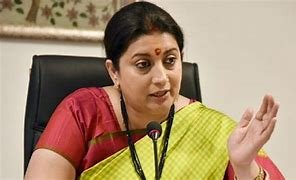On Tuesday, the Centre paid women employed in construction a 26-week maternity leave and requested that companies guarantee digital salary payments, Smriti Irani, Minister of Women and Child Development, stated on Tuesday.
Initiatives taken for the well-being of the women employees by the Ministry

“The advisory that I hold in my hands for female construction workers across the country mandates them to be given 26 weeks of maternity leave by their employers. Now, this is nothing less than revolutionary. Not just putting ink to paper, but ensuring officers actively consider the availability of such facilities to women” stated Irani, while she was releasing a recommendation about women’s employment.
These two were two of the many actions that were part of the advisory that the Ministries of Housing and Urban Affairs and Road Transport and Highways (MoRTH) sent to agencies who reported to them in an effort to promote their participation in the workforce.
Apart from childbirth, the advice also covers miscarriages. It stipulates that a woman working in the construction industry who has a miscarriage can take leave with pay equal to maternity benefits for a period of six weeks after the day of the miscarriage. “As per the advisory, the wage of women construction workers has to be transferred through an online medium to avoid them getting duped by their supervisors,” the minister stated.

It asked that, in order to comply with the provisions of the Inter-State Migrant Workmen (Regulation of Employment and Conditions of Service) Act and Rules, all employers in the highways sector provide facilities for migrant women workers, including latrines and urinals, washing machines, crèches, and adequate lodging. The advice also underlined how proactive businesses should be in putting policies and initiatives in place to support women’s entry into the workforce.
Additional recommendations by the Ministry
The recommendation highlights the necessity for employers to provide a secure and encouraging work environment for female employees working night shifts, as well as to make sure that transport services are available for pick-up and drop-off, particularly at night. Additionally, it outlines how to file complaints of sexual harassment against female employees in accordance with the guidelines set forth by the Sexual Harassment of Women at the Workplace (Prevention, Prohibition and Redressal) Act, 2013, protecting their rights by defining the timing and mode of salary payments.
Additionally, the guideline states that companies must make sure women workers receive weekly holidays, rest periods, and overtime compensation in accordance with their qualifications.
Employers were also recommended to provide rest breaks, appropriate working conditions, and other measures to improve the general welfare, safety, and health of female employees in shops and other commercial premises.
Ms. Irani further stated that the government has requested Central Universities to look into the possibility of creating working women’s dormitories on campus with government funding.
The minister while stating that other Central universities had already submitted written proposals said that “We have proposed in a combination – between the (Union) Ministry of Labour and the Women and Child Development Ministry – to our counterparts in the Ministry of Education that our Central universities can get additional support from the Ministry so they can now build hostels only for working women within the university environment,”
“While the government is taking various policy measures to support women in all aspects of work life, it is imperative that the employers should also take the lead in implementing the policies and programs in the right perspective to encourage women to join the workforce. Accordingly, an advisory is being issued to employers to increase the participation of women in the workforce,” the advisory said.
She spoke at a joint event hosted by the Women and Child Development Ministry and the Labor Ministry called ‘Women in the Workforce for Viksit Bharat’. During the occasion, the Union Labor Ministry presented a thorough guideline for employers to promote total involvement of women in the workforce.










